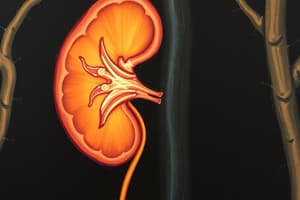Podcast
Questions and Answers
Which organ is responsible for filtering blood to produce urine?
Which organ is responsible for filtering blood to produce urine?
- Kidneys (correct)
- Urinary Bladder
- Urethra
- Ureters
The ureters are responsible for storing urine until excretion.
The ureters are responsible for storing urine until excretion.
False (B)
What process involves the movement of urine from the kidneys to the bladder?
What process involves the movement of urine from the kidneys to the bladder?
Transport
The ______________ regulates water and electrolyte balance in the body.
The ______________ regulates water and electrolyte balance in the body.
What is the function of the Loop of Henle in the nephron?
What is the function of the Loop of Henle in the nephron?
Antidiuretic Hormone (ADH) decreases water reabsorption in the kidneys.
Antidiuretic Hormone (ADH) decreases water reabsorption in the kidneys.
Name one common disorder of the excretory system.
Name one common disorder of the excretory system.
The final concentration of urine occurs in the ___________.
The final concentration of urine occurs in the ___________.
Match the following excretory system components with their functions:
Match the following excretory system components with their functions:
What role do Natriuretic Peptides play in the excretory system?
What role do Natriuretic Peptides play in the excretory system?
Flashcards are hidden until you start studying
Study Notes
Excretory System
Functions
- Waste Elimination: Removes metabolic waste products (urea, uric acid).
- Homeostasis: Regulates water, electrolyte balance, and blood pressure.
- Acid-Base Balance: Helps maintain pH levels in the body.
Main Organs
-
Kidneys
- Filter blood to produce urine.
- Regulate water and soluble substances.
- Contain nephron units (functional units).
-
Ureters
- Transport urine from kidneys to bladder.
- Muscular tubes that use peristalsis for movement.
-
Urinary Bladder
- Stores urine until excretion.
- Stretchable muscular sac that can hold about 400-600 mL.
-
Urethra
- Conducts urine from bladder to the outside.
- Varies in length between sexes (shorter in females).
Nephron Structure
- Glomerulus: A network of capillaries where blood filtration begins.
- Bowman's Capsule: Encases the glomerulus; collects filtrate.
- Proximal Convoluted Tubule (PCT): Reabsorption of water, electrolytes, and nutrients.
- Loop of Henle: Establishes a concentration gradient in the kidney.
- Distal Convoluted Tubule (DCT): Further adjusts electrolyte and acid-base balance.
- Collecting Duct: Final urine concentration and transport to the renal pelvis.
Process of Urine Formation
- Filtration: Blood is filtered in the glomerulus, producing filtrate.
- Reabsorption: Essential substances are reabsorbed in PCT and Loop of Henle.
- Secretion: Additional wastes are secreted into the tubules.
- Excretion: Final urine is transported to the bladder for elimination.
Regulation
- Antidiuretic Hormone (ADH): Increases water reabsorption in kidneys.
- Aldosterone: Regulates sodium and potassium balance.
- Natriuretic Peptides: Reduce blood pressure by promoting sodium excretion.
Disorders
- Kidney Stones: Hard deposits formed from minerals and salts.
- Urinary Tract Infections (UTIs): Infections in any part of the urinary system.
- Glomerulonephritis: Inflammation of the glomeruli, affecting filtration.
- Chronic Kidney Disease (CKD): Gradual loss of kidney function over time.
Importance
- Maintains overall body fluid balance.
- Essential for detoxification and waste management.
- Plays a critical role in regulating blood pressure and volume.
Excretory System Functions
- Waste elimination involves the removal of metabolic waste products such as urea and uric acid.
- Homeostasis is achieved by regulating water levels, electrolyte balance, and blood pressure.
- Acid-base balance is maintained to keep pH levels stable in the body.
Main Organs
- Kidneys: Filter blood to produce urine and regulate soluble substances; contain nephron units, which are functional structures.
- Ureters: Muscular tubes that transport urine from the kidneys to the bladder through peristalsis.
- Urinary Bladder: A stretchable muscular sac that stores urine until excretion; has a capacity of about 400-600 mL.
- Urethra: Expels urine from the bladder; its length varies between sexes, being shorter in females.
Nephron Structure
- Glomerulus: A capillary network where initial blood filtration takes place.
- Bowman's Capsule: Encases the glomerulus and collects the filtered fluid, known as filtrate.
- Proximal Convoluted Tubule (PCT): Reabsorbs essential water, electrolytes, and nutrients.
- Loop of Henle: Creates a concentration gradient in the kidney, crucial for water reabsorption.
- Distal Convoluted Tubule (DCT): Further regulates electrolyte balance and contributes to acid-base homeostasis.
- Collecting Duct: Responsible for the final concentration of urine and transports it to the renal pelvis.
Process of Urine Formation
- Filtration: Blood is filtered in the glomerulus, resulting in the production of filtrate.
- Reabsorption: Essential substances are absorbed back into the bloodstream in the PCT and Loop of Henle.
- Secretion: Additional waste products are secreted into the nephron tubules.
- Excretion: Final urine is delivered to the bladder for elimination from the body.
Regulation of Kidney Function
- Antidiuretic Hormone (ADH): Enhances water reabsorption in the kidney tubules, preventing dehydration.
- Aldosterone: Regulates sodium and potassium levels in the bloodstream, impacting electrolyte balance.
- Natriuretic Peptides: Lower blood pressure by promoting sodium excretion, thus reducing fluid volume.
Disorders of the Excretory System
- Kidney Stones: Hard mineral and salt deposits that form in the kidneys and can cause severe pain.
- Urinary Tract Infections (UTIs): Infections affecting any part of the urinary system, leading to discomfort and complications.
- Glomerulonephritis: Inflammation of the glomeruli affecting their ability to filter blood effectively.
- Chronic Kidney Disease (CKD): A progressive loss of kidney function over time, leading to potential kidney failure.
Importance of the Excretory System
- Maintains the overall fluid balance in the body, critical for physiological processes.
- Essential function in detoxification and effective waste management to avoid harmful buildup.
- Plays a vital role in regulating blood pressure and fluid volume within the circulatory system.
Studying That Suits You
Use AI to generate personalized quizzes and flashcards to suit your learning preferences.





